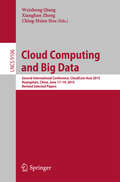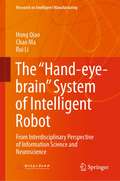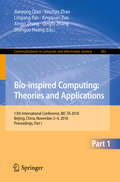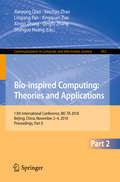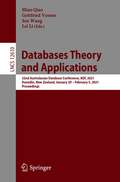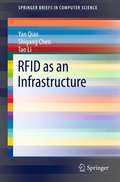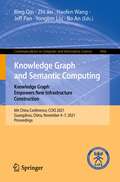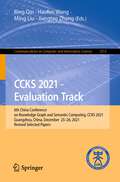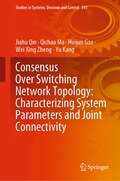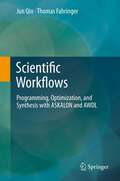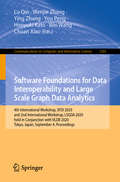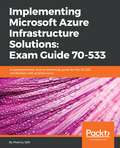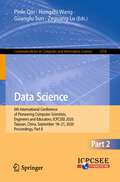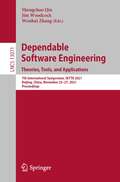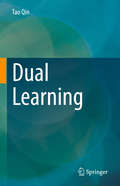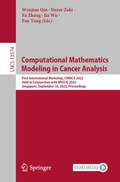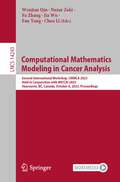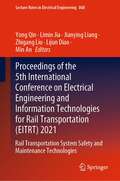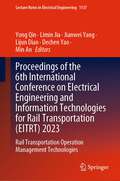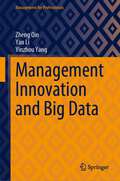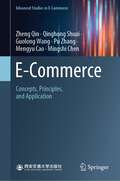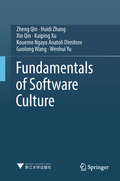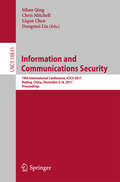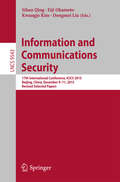- Table View
- List View
Cloud Computing and Big Data: Second International Conference, CloudCom-Asia 2015, Huangshan, China, June 17-19, 2015, Revised Selected Papers (Lecture Notes in Computer Science #9106)
by Weizhong Qiang Xianghan Zheng Ching-Hsien HsuThis book constitutes the refereed proceedings of theSecond International Conference on Cloud Computing and Big Data, CloudCom-Asia2015, held in Huangshan, China, in June 2015. The 29 full papers and two keynote speeches werecarefully reviewed and selected from 106 submissions. The papers are organizedin topical sections on cloud architecture; applications; big data and socialnetwork; security and privacy.
The “Hand-eye-brain” System of Intelligent Robot: From Interdisciplinary Perspective of Information Science and Neuroscience (Research on Intelligent Manufacturing)
by Hong Qiao Chao Ma Rui LiThis book reports the new results of intelligent robot with hand-eye-brain, from the interdisciplinary perspective of information science and neuroscience. It collects novel research ideas on attractive region in environment (ARIE), intrinsic variable preserving manifold learning (IVPML) and biologically inspired visual congnition, which are theoretically important but challenging to develop the intelligent robot. Furthermore, the book offers new thoughts on the possible future development of human-inspired robotics, with vivid illustrations. The book is useful for researchers, R&D engineers and graduate students working on intelligent robots.
Bio-inspired Computing: 13th International Conference, BIC-TA 2018, Beijing, China, November 2–4, 2018, Proceedings, Part I (Communications in Computer and Information Science #951)
by Jianyong Qiao Xinchao Zhao Linqiang Pan Xingquan Zuo Xingyi Zhang Qingfu Zhang Shanguo HuangThis two-volume set (CCIS 951 and CCIS 952) constitutes the proceedings of the 13th International Conference on Bio-inspired Computing: Theories and Applications, BIC-TA 2018, held in Beijing, China, in November 2018.The 88 full papers presented in both volumes were selected from 206 submissions. The papers deal with studies abstracting computing ideas such as data structures, operations with data, ways to control operations, computing models from living phenomena or biological systems such as evolution, cells, neural networks, immune systems, swarm intelligence.
Bio-inspired Computing: 13th International Conference, BIC-TA 2018, Beijing, China, November 2–4, 2018, Proceedings, Part II (Communications in Computer and Information Science #952)
by Jianyong Qiao Xinchao Zhao Linqiang Pan Xingquan Zuo Xingyi Zhang Qingfu Zhang Shanguo HuangThis two-volume set (CCIS 951 and CCIS 952) constitutes the proceedings of the 13th International Conference on Bio-inspired Computing: Theories and Applications, BIC-TA 2018, held in Beijing, China, in November 2018.The 88 full papers presented in both volumes were selected from 206 submissions. The papers deal with studies abstracting computing ideas such as data structures, operations with data, ways to control operations, computing models from living phenomena or biological systems such as evolution, cells, neural networks, immune systems, swarm intelligence.
Databases Theory and Applications: 32nd Australasian Database Conference, ADC 2021, Dunedin, New Zealand, January 29 – February 5, 2021, Proceedings (Lecture Notes in Computer Science #12610)
by Miao Qiao Gottfried Vossen Sen Wang Lei LiThis book constitutes the refereed proceedings of the 32nd Australasian Database Conference, ADC 2021, held in Dunedin, New Zealand, in January/February 2021. The 17 full papers presented were carefully reviewed and selected from 21 submissions. The Australasian Database Conference is an annual international forum for sharing the latest research advancements and novel applications of database systems, data-driven applications, and data analytics between researchers and practitioners from around the globe, particularly Australia and New Zealand. ADC shares novel research solutions to problems of todays information society that fullfil the needs of heterogeneous applications and environments and to identify new issues and directions for future research and development work.
RFID as an Infrastructure
by Yan Qiao Tao Li Shigang ChenRFID (radio frequency identification) tags are becoming ubiquitously available in object tracking, access control, and toll payment. The current application model treats tags simply as ID carriers and deals with each tag individually for the purpose of identifying the object that the tag is attached to. The uniqueness of RFID as an Infrastructure is to change the traditional individual view to a collective view that treats universally-deployed tags as a new infrastructure, a new wireless platform on which novel applications can be developed. The book begins with an introduction to the problems of tag estimation and information collection from RFID systems, and explains the challenges. It discusses how to efficiently estimate the number of tags in a large RFID system, considering both energy cost and execution time. It then gives a detailed account on how to collect information from a sensor-augmented RFID network with new designs that significantly reduce execution time.
Knowledge Graph and Semantic Computing: 6th China Conference, CCKS 2021, Guangzhou, China, November 4-7, 2021, Proceedings (Communications in Computer and Information Science #1466)
by Bing Qin Zhi Jin Haofen Wang Jeff Pan Yongbin Liu Bo AnThis book constitutes the refereed proceedings of the 6th China Conference on Knowledge Graph and Semantic Computing, CCKS 2021, held in Guangzhou, China, in November 2021. The 19 revised full papers and 9 short papers presented were carefully reviewed and selected from 170 submissions. The papers are organized in topical sections on knowledge extraction: knowledge graph representation and reasoning; knowledge acquisition and knowledge graph construction; linked data, knowledge integration, and knowledge graph storage management; natural language understanding and semantic computing; knowledge graph applications: semantic search, question answering, dialogue, decision support, and recommendation; knowledge graph open resources.
CCKS 2021 - Evaluation Track: 6th China Conference on Knowledge Graph and Semantic Computing, CCKS 2021, Guangzhou, China, December 25-26, 2021, Revised Selected Papers (Communications in Computer and Information Science #1553)
by Bing Qin Haofen Wang Ming Liu Jiangtao ZhangThis volume constitutes papers presented at the Evaluation Track of the 6th China Conference on Knowledge Graph and Semantic Computing, CCKS 2021, held in Guangzhou, China, in December 2021.The 17 competition papers went through a rigorious peer review and were accepted for publication. CCKS 2021 technology evaluation track aims to provide researchers with platforms and resources for testing knowledge and semantic computing technologies, algorithms and systems, promote the technical development in the field of domestic knowledge, and the integration of academic achievements and industrial needs.
Consensus Over Switching Network Topology: Characterizing System Parameters and Joint Connectivity (Studies in Systems, Decision and Control #393)
by Jiahu Qin Qichao Ma Huijun Gao Wei Xing Zheng Yu KangThis book aims to extend existing works on consensus of multi-agent systems systematically. The agents to be considered range from double integrators to generic linear systems. The primary goal is to explicitly characterize how agent parameters, which reflect both self-dynamics and inner coupling of each agent, and switching network topologies jointly influence the collective behaviors. A series of necessary and/or sufficient conditions for exponential consensus are derived. The contents of this book are as follows. Chapter 1 provides the background and briefly reviews the advances of consensus of multi-agent systems. Chapter 2 addresses the consensus problem of double integrators over directed switching network topologies. It is proven that exponential consensus can be secured under very mild conditions incorporating the damping gain and network topology. Chapter 3 considers generic linear systems with undirected switching network topologies. Necessary and sufficient conditions on agent parameters and connectivity of the communication graph for exponential consensus are provided. Chapter 4 furthers the study of consensus for multiple generic linear systems by considering directed switching network topologies. How agent parameters and joint connectivity work together for reaching consensus is characterized from an algebraic and geometric view. Chapter 5 extends the design and analysis methodology to containment control problem, where there exist multiple leaders. A novel analysis framework from the perspective of state transition matrix is developed. This framework relates containment to consensus and overcomes the difficulty of construction of a containment error.This book serves as a reference to the main research issues and results on consensus of multi-agent systems. Some prerequisites for reading this book include linear system theory, matrix theory, mathematics, and so on.
Scientific Workflows
by Jun Qin Thomas FahringerCreating scientific workflow applications is a very challenging task due to the complexity of the distributed computing environments involved, the complex control and data flow requirements of scientific applications, and the lack of high-level languages and tools support. Particularly, sophisticated expertise in distributed computing is commonly required to determine the software entities to perform computations of workflow tasks, the computers on which workflow tasks are to be executed, the actual execution order of workflow tasks, and the data transfer between them. Qin and Fahringer present a novel workflow language called Abstract Workflow Description Language (AWDL) and the corresponding standards-based, knowledge-enabled tool support, which simplifies the development of scientific workflow applications. AWDL is an XML-based language for describing scientific workflow applications at a high level of abstraction. It is designed in a way that allows users to concentrate on specifying such workflow applications without dealing with either the complexity of distributed computing environments or any specific implementation technology. This research monograph is organized into five parts: overview, programming, optimization, synthesis, and conclusion, and is complemented by an appendix and an extensive reference list. The topics covered in this book will be of interest to both computer science researchers (e.g. in distributed programming, grid computing, or large-scale scientific applications) and domain scientists who need to apply workflow technologies in their work, as well as engineers who want to develop distributed and high-throughput workflow applications, languages and tools.
Software Foundations for Data Interoperability and Large Scale Graph Data Analytics: 4th International Workshop, SFDI 2020, and 2nd International Workshop, LSGDA 2020, held in Conjunction with VLDB 2020, Tokyo, Japan, September 4, 2020, Proceedings (Communications in Computer and Information Science #1281)
by Lu Qin Wenjie Zhang Ying Zhang You Peng Hiroyuki Kato Wei Wang Chuan XiaoThis book constitutes refereed proceedings of the 4th International Workshop on Software Foundations for Data Interoperability, SFDI 2020, and 2nd International Workshop on Large Scale Graph Data Analytics, LSGDA 2020, held in Conjunction with VLDB 2020, in September 2020. Due to the COVID-19 pandemic the conference was held online. The 11 full papers and 4 short papers were thoroughly reviewed and selected from 38 submissions. The volme presents original research and application papers on the development of novel graph analytics models, scalable graph analytics techniques and systems, data integration, and data exchange.
Implementing Microsoft Azure Infrastructure Solutions: A comprehensive, end-to-end study guide for the 70-533 certification with practice tests
by Melony QinDevelop skills and knowledge for provisioning and managing services in Microsoft Azure and implement infrastructure componentsKey FeaturesBuild and manage robust infrastructure solutions on Microsoft AzurePlan and implement Azure storage, backup, and recovery servicesPrepare and boost your confidence with certification-based mock tests and solutionsBook DescriptionMicrosoft Azure is a prominent public cloud provider, recording the highest user base growth in the year 2017. Microsoft has prominent certifications that help architects, developers, and administrators gain hands-on knowledge while working on Azure. 70-533 is one such advanced-level certification, which deals with infrastructure solutions on Microsoft Azure.Implementing Microsoft Azure Infrastructure Solutions starts with an overview of the certification and an introduction to Microsoft Azure. Next, you will learn how to plan and implement virtual machines and containers, followed by designing and implementing service apps. As you make your way through the chapters, you will learn how to implement and manage virtual networks and Azure identities, as well as the Active Directory infrastructure in a hybrid environment. In the concluding chapters, you will learn how to plan and implement storage and security, and business continuity and disaster recovery (BCDR) strategies. You will also automate and monitor cloud management operations in Azure. By the end of the book, you will have covered all of the modules, along with the practice questions at the end of each chapter, which will be extremely helpful in passing the 70-533 certification exam.What you will learnExplore cloud basics and gain an overview of Microsoft AzurePlan and implement virtual machines and containers for scalability and resilienceUnderstand virtual networks' cross-premises connectivityLearn how to manage your Azure identitiesPlan and implement storage, security, and the BCDR strategyAutomate and monitor cloud management operations in AzureManage app services for resilience and availabilityInteracting with Azure Services by using ARM, the Azure CLI, and PowerShellWho this book is forImplementing Microsoft Azure Infrastructure Solutions is for senior cloud professionals who already have experience working with the Azure ecosystem and want to take their knowledge to the next level. Prior knowledge of the Azure ecosystem is necessary.
Data Science: 6th International Conference of Pioneering Computer Scientists, Engineers and Educators, ICPCSEE 2020, Taiyuan, China, September 18-21, 2020, Proceedings, Part II (Communications in Computer and Information Science #1258)
by Pinle Qin Hongzhi Wang Guanglu Sun Zeguang LuThis two volume set (CCIS 1257 and 1258) constitutes the refereed proceedings of the 6th International Conference of Pioneering Computer Scientists, Engineers and Educators, ICPCSEE 2020 held in Taiyuan, China, in September 2020. The 98 papers presented in these two volumes were carefully reviewed and selected from 392 submissions. The papers are organized in topical sections: database, machine learning, network, graphic images, system, natural language processing, security, algorithm, application, and education.
Dependable Software Engineering. Theories, Tools, and Applications: 7th International Symposium, SETTA 2021, Beijing, China, November 25–27, 2021, Proceedings (Lecture Notes in Computer Science #13071)
by Shengchao Qin Jim Woodcock Wenhui ZhangThis book constitutes the proceedings of the 7th International Symposium on Dependable Software Engineering, SETTA 2021, held in Beijing, China, in November 2021. The 16 full papers in this volume were carefully reviewed and selected from 39 submissions, and are presented with 3 abstracts of keynote speeches. They deal with latest research results and ideas on bridging the gap between formal methods and software engineering.
Dual Learning
by Tao QinMany AI (and machine learning) tasks present in dual forms, e.g., English-to-Chinese translation vs. Chinese-to-English translation, speech recognition vs. speech synthesis,question answering vs. question generation, and image classification vs. image generation. Dual learning is a new learning framework that leverages the primal-dual structure of AI tasks to obtain effective feedback or regularization signals in order to enhance the learning/inference process. Since it was first introduced four years ago, the concept has attracted considerable attention in multiple fields, and been proven effective in numerous applications, such as machine translation, image-to-image translation, speech synthesis and recognition, (visual) question answering and generation, image captioning and generation, and code summarization and generation. Offering a systematic and comprehensive overview of dual learning, this book enables interested researchers (both established and newcomers) and practitioners to gain a better understanding of the state of the art in the field. It also provides suggestions for further reading and tools to help readers advance the area. The book is divided into five parts. The first part gives a brief introduction to machine learning and deep learning. The second part introduces the algorithms based on the dual reconstruction principle using machine translation, image translation, speech processing and other NLP/CV tasks as the demo applications. It covers algorithms, such as dual semi-supervised learning, dual unsupervised learning and multi-agent dual learning. In the context of image translation, it introduces algorithms including CycleGAN, DualGAN, DiscoGAN cdGAN and more recent techniques/applications. The third part presents various work based on the probability principle, including dual supervised learning and dual inference based on the joint-probability principle and dual semi-supervised learning based on the marginal-probability principle. The fourth part reviews various theoretical studies on dual learning and discusses its connections to other learning paradigms. The fifth part provides a summary and suggests future research directions.
Computational Mathematics Modeling in Cancer Analysis: First International Workshop, CMMCA 2022, Held in Conjunction with MICCAI 2022, Singapore, September 18, 2022, Proceedings (Lecture Notes in Computer Science #13574)
by Wenjian Qin Nazar Zaki Fa Zhang Jia Wu Fan YangThis book constitutes the proceedings of the First Workshop on Computational Mathematics Modeling in Cancer Analysis (CMMCA2022), held in conjunction with MICCAI 2022, in Singapore in September 2022. Due to the COVID-19 pandemic restrictions, the CMMCA2022 was held virtually. DALI 2022 accepted 15 papers from the 16 submissions that were reviewed. A major focus of CMMCA2022 is to identify new cutting-edge techniques and their applications in cancer data analysis in response to trends and challenges in theoretical, computational and applied aspects of mathematics in cancer data analysis.
Computational Mathematics Modeling in Cancer Analysis: Second International Workshop, CMMCA 2023, Held in Conjunction with MICCAI 2023, Vancouver, BC, Canada, October 8, 2023, Proceedings (Lecture Notes in Computer Science #14243)
by Wenjian Qin Nazar Zaki Fa Zhang Jia Wu Fan Yang Chao LiThis volume LNCS 14243 constitutes the refereed proceedings of the Second International Workshop, CMMCA 2023, Held in Conjunction with MICCAI 2023, on October 8, 2023, in Vancouver, BC, Canada. The 17 full papers presented were carefully reviewed and selected from 25 submissions. The conference focuses on the discovery of cutting-edge techniques addressing trends and challenges in theoretical, computational, and applied aspects of mathematical cancer data analysis.
Proceedings of the 5th International Conference on Electrical Engineering and Information Technologies for Rail Transportation: Rail Transportation System Safety and Maintenance Technologies (Lecture Notes in Electrical Engineering #868)
by Yong Qin Limin Jia Jianying Liang Zhigang Liu Lijun Diao Min AnThis book reflects the latest research trends, methods, and experimental results in the field of electrical and information technologies for rail transportation, which covers abundant state-of-the-art research theories and ideas. As a vital field of research that is highly relevant to current developments in a number of technological domains, the subjects it covered include intelligent computing, information processing, communication technology, automatic control, etc. The objective of the proceedings is to provide a major interdisciplinary forum for researchers, engineers, academicians, and industrial professionals to present the most innovative research and development in the field of rail transportation electrical and information technologies. Engineers and researchers in academia, industry, and government will also explore an insightful view of the solutions that combine ideas from multiple disciplines in this field. The volumes serve as an excellent reference work for researchers and graduate students working on rail transportation and electrical and information technologies.
Proceedings of the 6th International Conference on Electrical Engineering and Information Technologies for Rail Transportation: Rail Transportation Operation Management Technologies (Lecture Notes in Electrical Engineering #1137)
by Yong Qin Limin Jia Jianwei Yang Lijun Diao Dechen Yao Min AnThis book reflects the latest research trends, methods, and experimental results in the field of electrical and information technologies for rail transportation, which covers abundant state-of-the-art research theories and ideas. As a vital field of research that is highly relevant to current developments in a number of technological domains, the subjects it covered include intelligent computing, information processing, communication technology, automatic control, etc. The objective of the proceedings is to provide a major interdisciplinary forum for researchers, engineers, academicians, and industrial professionals to present the most innovative research and development in the field of rail transportation electrical and information technologies. Engineers and researchers in academia, industry, and government will also explore an insightful view of the solutions that combine ideas from multiple disciplines in this field. The volumes serve as an excellent reference work for researchers and graduate students working on rail transportation and electrical and information technologies.
Management Innovation and Big Data (Management for Professionals)
by Zheng Qin Yan Li Yinzhou YangAdhering to the combination of theoretical introduction and practical case introduction, this book summarizes the basic concepts and methods in management and big data analysis at home and abroad and introduces a large number of relevant practical cases, especially new cases in the Internet era, to help readers integrate theoretical knowledge into practical applications. The chapters of this book are interrelated and independent of each other, making it easy for the reader to study in pieces or to delve deeper into a particular topic of interest. Covering an array of theories about management and big data at home and abroad, this book lays a solid foundation for being an authentic manager. It is organized into sections on decision-making, organization, leadership, control, innovation, and big data to fully dissect and summarize the basic concepts of these characters in management and to show the basic methods that managers can use to solve problems. Each section contains a large number of examples to demonstrate how entrepreneurs successfully manage their large companies and overcome the difficulties in the business, utilizing the corresponding management functions or big data technology. Further, in order to adapt to the development of the Internet era, this book also absorbs a lot of practice cases of management innovation and big data which have emerged in recent years based on advanced network platform and big data analysis. This book puts great emphasis on the innovative function of management, adding more comprehensive methods and more updated cases related to the Internet.
E-Commerce: Concepts, Principles, and Application (Advanced Studies in E-Commerce)
by Zheng Qin Qinghong Shuai Guolong Wang Pu Zhang Mengyu Cao Mingshi ChenThis book mainly discusses the background of e-commerce, the basic knowledge of e-commerce, the basic models of e-commerce, the basic principles of e-commerce and the cases of e-commerce. This book has formed a theoretical system of e-commerce with a clear integration boundary. The introduction of the systematic theory is guided by the background of e-commerce, centered on the model of e-commerce, paved with the principles of e-commerce and integrated with the cutting-edge cases. This book defines the basic concepts, models and principle of e-commerce in the form of mathematical analysis and analyzes the basic theory of e-commerce from the perspective of mathematical model. This enables readers to form an abstract understanding of the connotation and extension of e-commerce. It establishes a knowledge system with the background of social ecology, engineering ecology and innovative ecology, taking the models of e-commerce as the core, the principles of e-commerce as the process, the architecture of e-commerce as the platform and the operation and management of e-commerce as the means to integrate the knowledge into application. This book uses case study to comprehensively analyze and apply the knowledge system involved in e-commerce, combining theoretical research with engineering research. Through this book, readers can systematically master all kinds of theories involved in e-commerce. This book aims at different professional and diverse reader groups. It can be used as the basic books for students of various e-commerce-related specialties.
Fundamentals of Software Culture
by Zheng Qin Huidi Zhang Xin Qin Kaiping Xu Kouemo Ngayo Dimitrov Guolong Wang Wenhui YuAs the first book about software culture, this book discusses software culture from three perspectives including historical perspective, the classification of software and software applications. This book takes credit from the view of science and technology development. It analyzed scientific innovations and the social areas promoted following the growth of technology. And according to the fact that information helps to build human cultural form, we proposed the concept and researching method of software culture. The aim of writing this book is to strengthen the connection between software and culture, to replenish knowledge system in the subject of software engineering, and to establish a new area of study that is the culture of software.
Information and Communications Security: 17th International Conference, Icics 2015, Beijing, China, December 9-11, 2015, Revised Selected Papers (Lecture Notes In Computer Science #9543)
by Sihan Qing Chris Mitchell Liqun Chen Dongmei LiuThis book constitutes the refereed proceedings of the 19th International Conference on Information and Communications Security, ICICS 2017, held in Beijing, China, in December 2017. The 43 revised full papers and 14 short papers presented were carefully selected from 188 submissions. The papers cover topics such as Formal Analysis and Randomness Test; Signature Scheme and Key Management; Algorithms; Applied Cryptography; Attacks and Attacks Defense; Wireless Sensor Network Security; Security Applications; Malicious Code Defense and Mobile Security; IoT Security; Healthcare and Industrial Control System Security; Privacy Protection; Engineering Issues of Crypto; Cloud and E-commerce Security; Security Protocols; Network Security.
Information and Communications Security
by Sihan Qing Eiji Okamoto Kwangjo Kim Dongmei LiuThis book constitutes the thoroughly refereed post-conference proceedings of the 17th International Conference on Information and Communications Security, ICISC 2015, held in Beijing, China, in December 2015. The 24 revised full papers and 19 short papers presented were carefully selected from 148 submissions. The papers provide the latest results in research and development in the field of information security and applied cryptology.
Information and Communications Security: 17th International Conference, ICICS 2015, Beijing, China, December 9-11, 2015, Revised Selected Papers (Lecture Notes in Computer Science #9543)
by Sihan Qing Eiji Okamoto Kwangjo Kim Dongmei LiuThis book constitutes the thoroughly refereed post-conference proceedings of the 17th International Conference on Information and Communications Security, ICISC 2015, held in Beijing, China, in December 2015.The 24 revised full papers and 19 short papers presented were carefully selected from 148 submissions. The papers provide the latest results in research and development in the field of information security and applied cryptology.
